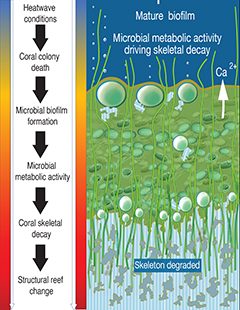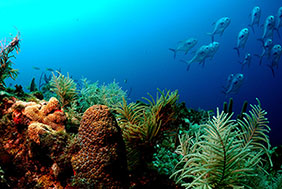-
Home
-
Data & Publications
-
Regional Portals
- About Regional Portals
- Florida
- Navassa Island
- Puerto Rico
- Flower Garden Banks
- U.S. Virgin Islands
- American Samoa
- Commonwealth of the Northern Mariana Islands
- Federated States of Micronesia
- Guam
- Main Hawaiian Islands
- Republic of the Marshall Islands
- Northwestern Hawaiian Islands
- Republic of Palau
- Pacific Remote Island Areas
-
CRCP Activities
- Glossary
Rapid coral decay is associated with marine heatwave mortality events on reefs

Severe marine heatwaves are now more common around the globe due to rapid climate change caused by human actions. This increase in marine heatwaves is resulting in an unprecedented uptick in the frequency and severity of mortality within marine ecosystems, including on coral reefs. The degradation of coral reefs will result in the collapse of ecosystem services that sustain over half a billion people globally.
A new study published in the journal Current Biology shows that marine heatwaves on coral reefs are biologically distinct from, but can cause and/or be more detrimental than coral bleaching events. This study was led by researchers from the University of New South Wales Sydney, University of Newcastle, University of Technology Sydney, James Cook University, and the NOAA Coral Reef Watch program. A major finding of this investigation is that Marine heatwaves are causing rapid heat-induced mortality of coral colonies as well as coral skeleton dissolution. This leads to the loss of the complex three-dimensional coral reef framework, which serves as habitat for many reef organisms. During heatwave-induced mortality events, exposed coral skeletons are, within days, encased by a complex biofilm of algae and bacteria. Their metabolic activity accelerates calcium carbonate dissolution to levels that significantly exceed documented accretion rates of healthy corals in normal seawater conditions. This bioerosion reduces the coral's skeletal density and hardness, and increases porosity.
This study demonstrates that severe heatwave-induced mortality events should be considered biologically distinct events that cause even more extreme damage than bleaching or mass bleaching on coral reefs. Heatwave mortality events, and rapid reef decay, will increase in frequency as marine heatwaves intensify. The results further show that immediate actions are necessary, on a global scale to reduce marine heatwave events and the destruction they cause.
Citation: Leggat, W, Camp EF, Suggett DJ, Heron SF, Fordyce AJ, Gardner S, Deakin L, Turner M, Beaching LJ, Kuzhiumparambil U, Eakin CM, Ainsworth TD. Rapid coral decay is associated with marine heatwave mortality events on reefs, Current Biology (2019), https://doi.org/10.1016/j.cub.2019.06.077


